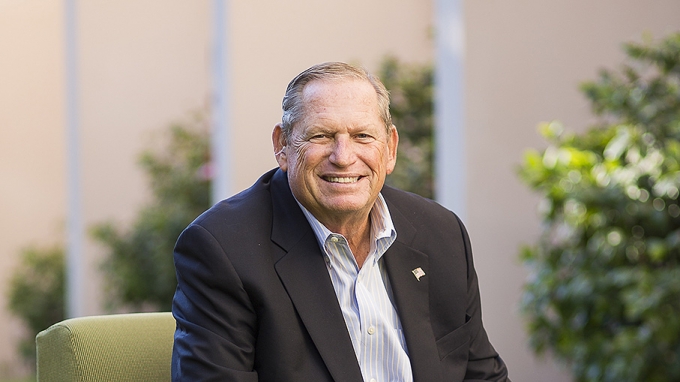Steve Cooper graduated from the UCSB College of Engineering in 1968 with a degree in electrical engineering. He and his wife, Sue, met and married while they were students.
He started at Intel when revenues were $50 million; now they’re over $100 billion. He has spent much of his life as a manager and entrepreneur, primarily in the semiconductor field, leading startups and guiding corporate turnarounds. Since 2000, he has pledged $1 million to the CoE and dedicated thousands of hours to serving the university, as a member of the UCSB Foundation and as a current member of the CoE Dean’s Cabinet.
Convergence caught up with him during the cabinet’s conference in November.
C: What made you decide to give to UCSB?
SC: I was working on TMP and saw a real need there, so I decided to funnel some of my funds into it. I liked having the chance to reconnect with the university, and I felt the need to give back. I wasn’t a great engineer, but I’ve done some pretty good things as a CEO, and my UCSB engineering degree is what allowed me to do that. There were a few turning points in my life, and UCSB was one of them.
C: Can you take us through your involvement with TMP?
SC: TMP started in about 1998, and I’ve been involved with it since about 2000. There was a period when the university and the state were in a bad financial situation, and we didn’t know if the program would continue. But we kept it running, and we can thank Chancellor Yang and [then-chair] Bob York for winning wide support for it, both across campus and in the UC Office of the President. Now it has a solid foundation, staff, and facilities. It attracts students from many departments. It has a master’s program, and our first TMP PhD candidate will be starting soon. It offers students a great opportunity to form teams and learn how to work on projects with colleagues from other disciplines. It’s not just research, technology, and engineering; it’s a blend of everything, which is the direction the world is going.
C: How is it for you to mentor students and to be involved in their success?
SC: I find it really stimulating to interact with students here at UC Santa Barbara, whether they are in engineering or somewhere else. They’re brilliant. I mean, I couldn’t get into this school with the grades required today [laughs]. But also, I’m impressed by how much they know and how much they’ve traveled the world. And their technical expertise is just incredible. People sometimes disparage today’s youth, but I’m so impressed by what I see at UCSB.
C: Can you tell us a little about the Cooper Computer Lab?
SC: In 2006 I was ready to give a sizable gift, and it was a naming opportunity. I can’t tell you how rewarding it has been. At the time I thought, It’s a computer lab; they’ll put some computers in it and it will get some use. But in reality, it has been extremely well received. It’s used by many people on campus. And I’ve been especially pleased by the feedback from professors. They’re so grateful to have it. That’s true of everything I’ve contributed to UCSB: I’m very satisfied with what’s been accomplished.
C: What is it about UCSB that makes you want to continue to support it?
SC: The real strength of UC Santa Barbara is interdisciplinary cooperation. It’s something other universities talk about, but it exists here unlike in any other place. I’ve worked at other elite California universities, and I saw that the silos were so formed, so tall, and so impenetrable that, despite the efforts of a lot of good professors, they’ve never been able to establish the kind of cross-disciplinary cooperation we have here. When I went here we had Quonset huts, and professors had to share space and share everything. There is a belief that that sharing is part of what has led to today’s culture of cooperation and collaboration across campus.
C: What stands out to you about UCSB and the College of Engineering today?
SC: I believe that neither UCSB nor the College of Engineering gets the credit it deserves for what it accomplishes. I hope to see that change during my lifetime. The greater academic community knows where we stand and how we rank. But prospective students and parents may not recognize that we have Nobel laureates, or that students have the unique opportunity here to work on research as undergraduates.
C: What would you say to others who might be considering a gift to support the CoE?
SC: The opportunity here is to identify what interests you — whether it’s business, as it was for me with TMP, or technology or medicine, or something else — and have a one-on-one relationship with someone at the university who can keep you current on what’s going on. Some of the most gratified donors I know have supported individual students, who have come to their houses and presented progress to them. It’s a phenomenal experience and an opportunity to pursue one of your passions and see a tangible return on your donation.
STEVE COOPER: 3 Reasons to Support the College of Engineering

